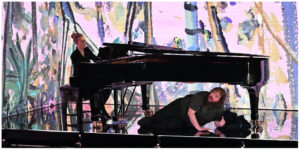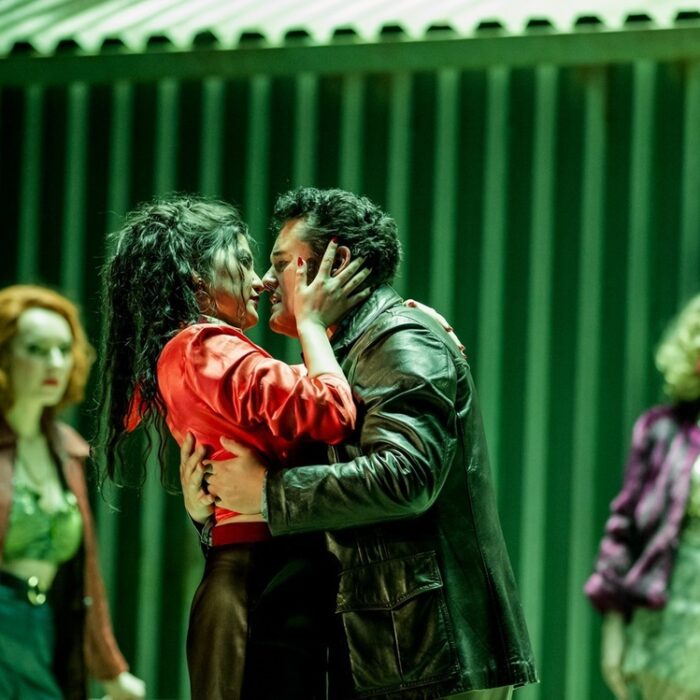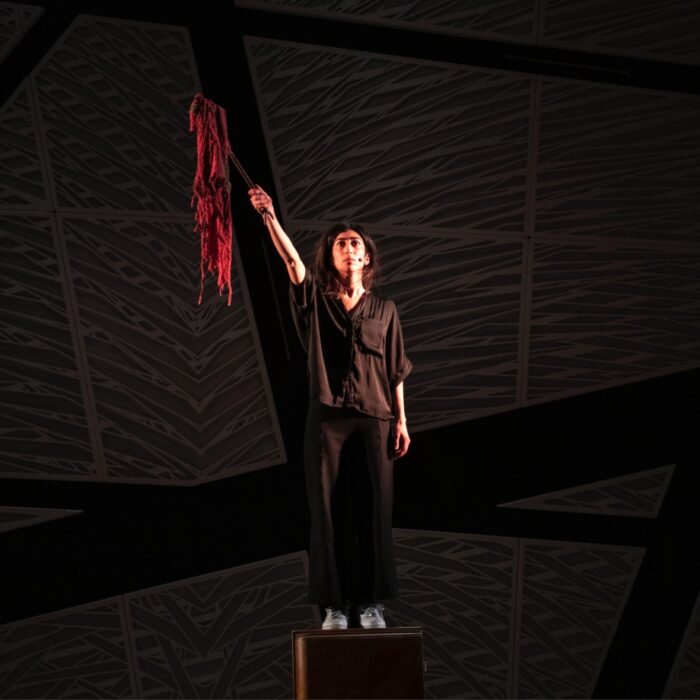
Barbican 2022 Review: A Winter’s Journey
A Striking Realisation of Schubert from Lindy Hume for Allan Clayton & Kate Golla
By Benjamin Poore(Photo credit: Mark Allen/Barbican)
What tenor Allan Clayton doesn’t know about misery probably isn’t worth knowing. His latest successes have been studies in anguish, specializing in alienated outsiders, or figures squatting on the borderland between life and death: Brett Dean’s “Hamlet,” “Peter Grimes” at the Royal Opera House Covent Garden and the Met, and, latterly for London audiences, a standout turn as the dying Gerontius in Elgar’s numinous oratorio at the BBC Proms last summer.
Now, with Kate Golla at the piano, he turns his attention to Franz Schubert’s foresighted masterpiece of existential despair “Winterreise,” 24 settings of Wilhelm Müller from the final year of the composer’s life whose bleakness appalled his friends when he played it for them. Their concert at London’s Barbican Hall – risking the famously unyielding acoustic for something as intimate as song – is the culmination of a lengthy tour of this project, which started under the auspices of Musica Viva in Australia.
A New Perspective
It is billed “A Winter’s Journey” – a title whose article spotlights the myriad ways there are of conceiving and tackling this centerpiece of the lieder tradition, as well perhaps as the singular nature of Clayton’s artistic contribution at this moment in time. “A Winter Journey” conjoins Schubert’s music with projections of paintings by Australian landscape artist Fred Williams – winter is a state of mind more than a weather forecast, given Williams’ invocation of the Australian bush and traditional Aboriginal art in his work. In itself this is a striking move, provincializing this most “Mitteleuropa” of works by resetting it in a non-European context and tying its experiences of despair, loss, and solitude to a wholly different landscape.
A central box with walls at right angles sat at the middle of the stage, framing action directed by Lindy Hume, onto which the images are projected. It’s hardly the first time “Winterreise” has been given a little dramaturgical push: Netia Jones directed Ian Bostridge in Hans Zender’s orchestration of the piece at the same venue a few years ago; artist William Kentridge also designed a version toured by Matthias Goerne in recent years. Last year even saw the BBC broadcast a filmed realization starring baritone Benjamin Appl atop a snow-capped mountain.
In “Winterreise” – unlike “Die schöne Müllerin” – continuity is psychological rather than narrative, with the 24 songs spiraling towards desinitegration. Hume uses the bare set well: at the end of “Rast,” where the wandered pitches up at a charcoal burner’s hut, Clayton winds down the song and rolls up his jacket as a pillow, settling under the piano. As he drifted off to sleep the eerie tinkling of “Frühlingstraum” crept in. He seldom stepped outside the box, except to begin and end the cycle, silhouetted to great effect against the far wall.
Williams’ paintings felt mostly decorative, though hit the emotional beats at points; cramming them into a relatively small space when the landscape they evoke is so expansive feels like we’re only glimpsing them through a keyhole. Sometimes they drifted frieze-like from one side to the other; the most effective moment comes at the end of “Die Krahe,” the wanderer’s ghoulish paean to his Corvid companion, where we suddenly come spinning up to take a bird’s eye view. In their favor, though, the slashing lines and vivid colors of Williams’ work evokes an emotional wildness and hallucinatory surrealism that chimes with the visionary aspect of this outsider, whose grasp on reality grows ever more tenuous.
Braving Illness
Clayton had a chest infection but soldiered on nonetheless. The impact was felt, certainly: high notes were not dwelled on and lacked some of the gleam we might expect; there was a degree of fraying around the lower reaches; changes of registration had a little more grit to them than usual.
But Clayton has developed such an articulate stage persona that these flaws are almost obliterated by the sheer force of his characterisation. There were still plenty of standout vocal moments: the sudden softness on “mein Herz” in “Rast;” the sickly-sweet head voice in “Täuschung;” a breathy panic in the treacherous offbeats of “Letze Hoffnung,” disconcertingly set up by Golla’s piano. The size of his voice, even when sick, suits the size of the space, and as an actor he brought a deeply-moving truthfulness and urgency to the work, which never failed to thrill.
Kate Golla had a polished if relatively unadventurous way with her role. Tempi were fairly pedestrian but gave Clayton plenty of space to act. What was really needed was a sharper sense of the internal dramatic relationship of singer and piano – in some versions the pianist is by turns sympathetic ear, antagonist, or indeed harbinger of something especially dark, as in the final two songs.
One canny moment saw an upturning of expectations along just these lines: “Die Post,” which is normally preceded by a short throat-clearing break at the midpoint of the cycle, started attacca, with Clayton pointing accusingly at Golla in a moment of surprising levity; Hume’s direction could’ve given us much more of this dynamism. Silences between songs – which can have such extraordinary potency even in conventional presentations, let alone here – could have had greater weight and drama (Schubert’s late music is a reminder that he is one of the great composers of silence).
A few minor quibbles: surtitles sat above the central box, but only intermittently set out the text; the atmospheric darkness made reading the libretto in the program quite impossible. Fine for those who know the work backwards – “Winterreise” certainly attracts obsessive sorts – but surely dissatisfying for relative novices, who might well be drawn to hearing the piece for the first time in this imaginative presentation (as opposed to the more conventional tie-and-tails approach of Wigmore Hall across the city).
Given Clayton’s superb form in singing in English, there is surely a strong case for using Jeremy Sams’ brittle English translation from 2018, and dialing up the immediacy even further. But all in all, a thrilling evening of song, and a refreshing attempt to open up a repertory piece we know too well.


